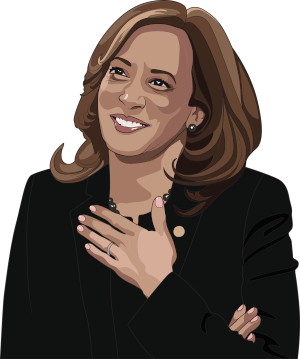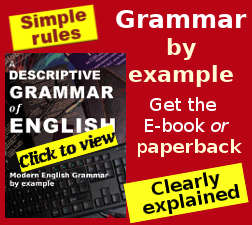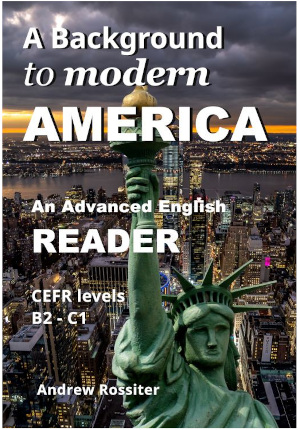The US Presidential Election '24
American society
Updated - The 2024 American Presidential Election was like none before.
 The United States Presidential Election takes place every four years,
and each time it
happens, it dominates the media not just in the USA but
worldwide. The 2024 Presidential Election was originally predicted to
be a re-run of the 2020
contest pitting Joe Biden, the outgoing
president, against Donald Trump, who was president from 2017 to 2021.
But with Biden's withdrawal, and his replacement as the Democratic
contender by vice-president Kamala Harris, the US election attracted even more
worldwide attention than usual.... And it was not just because one of
the candidates has been convicted
in a criminal court.
The United States Presidential Election takes place every four years,
and each time it
happens, it dominates the media not just in the USA but
worldwide. The 2024 Presidential Election was originally predicted to
be a re-run of the 2020
contest pitting Joe Biden, the outgoing
president, against Donald Trump, who was president from 2017 to 2021.
But with Biden's withdrawal, and his replacement as the Democratic
contender by vice-president Kamala Harris, the US election attracted even more
worldwide attention than usual.... And it was not just because one of
the candidates has been convicted
in a criminal court.
Until the end of the twentieth century, American Presidential Elections tended to oppose two men representing two parties with platforms that were not terribly different. Even so, they attracted interest worldwide, for the main reason that the US President was seen to be the most powerful man in the world – which in many respects he was and still is.
 American
Presidential Elections
were predictable, and seen as model examples of democracy in action.
Americans do not vote directly for a president, but for electors who
will choose the president; but even if the process of choosing an
American President is not "direct democracy", it is a clearly defined
democratic process about which, until the start of the twenty-first
century, there was little argument.
American
Presidential Elections
were predictable, and seen as model examples of democracy in action.
Americans do not vote directly for a president, but for electors who
will choose the president; but even if the process of choosing an
American President is not "direct democracy", it is a clearly defined
democratic process about which, until the start of the twenty-first
century, there was little argument.
Every four years, a Presidential Election would oppose two main candidates, one a Republican and the other a Democrat, plus a few outsiders who rarely achieved any significant result, and never got elected.
The Republican Party was seen more as the party of big business, and as more socially conservative. The Republicans have long had a reputation for being strong on national defense and the aggressive pursuit of U.S. interests, yet significantly it was Democratic Presidents, Franklin D. Roosevelt and John F. Kennedy, not Republicans, who took the USA into its most important conflicts in recent times, the Second World War and the Vietnam War.
As for the Democrats, they are seen as being a more socially tolerant party, with a more progressive liberal ideology; they are also seen as the party that believes more strongly in the role of the federal government in managing economic and social issues. Democrats have typically favored policies such as social welfare programs, environmental protection, and civil rights protections.
Yet for many years there was no massive ideological difference between the two. Both parties stood for accepted "American values", including hard work, traditional moralities, and the belief that the USA was a country in which anyone should be able to succeed. Both believed in capitalism, and still do. Yet within each party, different people would attach different meanings to those values, to the extent that for many American voters, it was not always easy to establish a clear distinction between the Democrats and the Republicans. It is still not always clear, given that there are plenty of conservative-minded Democratic representatives, notably in the central part of the USA, and there are also some quite socially liberal moderate Republicans.
It was in 2016 that divisions between the two main parties became more visible. The eruption into center stage of the Republican Party of a former businessman turned reality TV presenter, called Donald Trump, set the cat among the pigeons. Trump's neo-conservative brand of personality politics caused havoc in the party, led to the resignation of many of the party's more moderate members, and defined the nature of Republicanism for the coming years. Trump's populism and personality appalled many in the Republican party, but it appealed to lots of voters, specially in predominantly white rural areas. And the rest, as they say, is history. In spite of calling for his Democratic rival in the 2016 elections, Hillary Clinton, to be locked up – the kind of personal attack that presidential candidates would never have used in the past – Trump won. It is worth noting that he won thanks to the electoral college system, despite losing by over 2% in the popular vote.
During his term in office, Trump showed himself to be dogmatic, erratic, but determined. He prided himself on a tough stance on immigration, both legal and illegal, on rolling back environmental legislation, and on questioning America's international alliances. He even had two meetings with North Korea's dictator Kim Jong Un. One of his legacies was to appoint three very conservatives judges to the Supreme Court, ensuring that the Court will have a conservative majority for some years to come; the most significant consequence of this came in 2022, when the Supreme Court overturned the historic 1973 "Roe vs. Wade" ruling, thus removing an American woman's automatic right to have an abortion.
So it was no surprise that in 2020, the world's eyes were on the USA as Trump tried to get reelected; they remained even more concentrated on Washington in the weeks and months that followed, when Trump refused to recognize that he had lost to Joe Biden. The ex-president remained headline news worldwide for weeks, most notably on 6th-7th January 2021 when he defiantly encouraged his empassioned supporters to march on the Capitol.
Outside of the USA, most people imagined that that would be the end of Donald Trump. It was not, far from it. And so, as the 2024 US Presidential Election loomed closer, worldwide attention once again focused on the battle for the White House. This time the differences between the Republicans and the Democrats are as stark as the different personalities of the two candidates, Trump and Harris. The 2024 election was about the very nature of American society and democracy for the years to come - divisive or consensual, inward-looking or outward-looking, exclusive or inclusive. The age when a Presidential Election in the USA was essentially a choice between two varying visions of the American Dream, is now well in the past.
No wonder the world is looking on.
Follow this link for more on the ► American Presidency
Discover grammar in a new light
"A breath of fresh air" - IATEFL Voices

Print & ebook from Amazon,
Print book from Barnes & Noble, Waterstones & other good bookshops
a re-run: a repeat - platforms: programs - in many respects : in many ways - progressive, liberal - socially liberal, tolerant of differences - welfare: medical and social services - conservative-minded: with conservative opinions - havoc: chaos - erratic: unpredictable - prided himself on: was proud that - legacy - something that affects the future - to loom : to come slowly into view -
For other words and expressions, see the exercise below.
The word "liberal". This can be a very confusing word as it has two very different meanings. In US politics, liberal is mostly used as the opposite of conservative, i.e. "progressive" or even "socialist". However it can also mean economically liberal, i.e. against state intervention in the economy, so the opposite of "socialist".
Trump has decribed Harris as "the most liberal candidate ever"... but he's also called her a communist ! In Trump's vocabulary, and for many Americans, the two terms are synonyms.
Confusingly however, the term neo-liberal is ued worldwide to describe ultra conservative economic policies... those proned by Trump. According to Investopedia, neoliberalism is "a political and economic philosophy that emphasizes free trade, deregulation, globalization, and a reduction in government spending" .
► More American history texts: Gettysburg (Advanced) - Ellis Island (Advanced) - Martin Luther King (Advanced) - Rosa Parks (Advanced) - Thanksgiving (Advanced) - Buffalo Bill (Intermediate)
Copyright notice.
This resource is © copyright Linguapress - This text may not be reproduced on other websites nor in printed form without written permission from the publishers. Reproduction is authorised exclusively for personal use by students, or for use by teachers with their classes.
Interactive student worksheet
Exercises:
1. Words, expressions and meaning. Choose the nearest equivalent of each of the following expressions: click the down arrow and select the correct answer.
- Pitted:
- is liable to :
- achieved :
- stood for :
- former :
- set the cat among the pigeons... :
- resignation :
- appalled :
- stance :
- rolling back :
- appoint
- a ruling
- far from it:
- no wonder :
Written expression: Rephrasing
Rewrite these sentences from the original article in your own words, connecting the words given in the order given. The spaces available will expand to take your text1. The eruption into center stage of the Republican Party of a former businessman turned reality TV presenter, called Donald Trump, set the cat among the pigeons.
2. worldwide attention once again focuses on the battle for the White House.
Teachers.
Interactivity: This text and its interactive exercises can be used by students on their own computers or smartphones, or in class, with text and exercises projected on an interactive whiteboard or screen. If using an interactive whiteboard, for the words exercise pull down the list of options and get students to select the correct answer, either doing so individually or collectively.Kamala Harris and the possessive.
There is a contrived online controversy as to whether one should write Harris' ( s apostrophe) as the possessive form of the name, or Harris's ('s apostrophe s). The answer is perfectly clear, there is no controversy. Both forms are acceptable. But note that: whichever form is written, the pronunciation is the same: ['hærisiz ]Note the pronunciation of the word apostrophe, [æ 'pos trə fi].
Language points.
Paragraph 4. Use of would. "a Presidential Election would oppose two main candidates". We coiuld also say "a Presidential Election opposed two main candidates." By adding would, the writer stresses the habitual nature of the action in the past, which is no loger true today.Paragraph 8. Pay attention to the words appalled and appealed to - two similar words with almost opposite meanings.
Last paragraph: Outside of the USA. This is an Americanism. In Briitish English, of is not usually used after the preposition outside.



 Copyright
information.
Copyright
information.